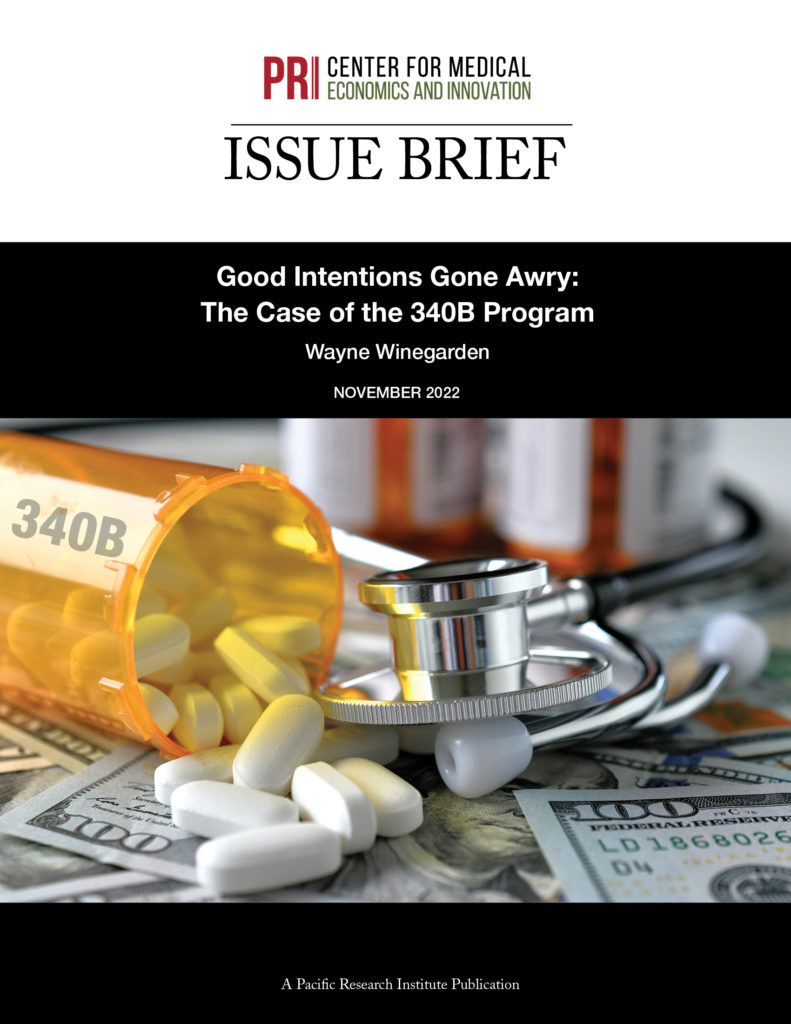NEW BRIEF: 340B Providers Reap Big Profits, Should Be Reformed to Ensure At-Risk Patients Receive Affordable Care
 SACRAMENTO – The broken 340B program, designed to provide affordable care for at-risk patients, creates massive profits for providers without necessarily improving patient health outcomes and should be reformed, finds a new issue brief released today by the Center for Medical Economics and Innovation at the nonpartisan Pacific Research Institute.
SACRAMENTO – The broken 340B program, designed to provide affordable care for at-risk patients, creates massive profits for providers without necessarily improving patient health outcomes and should be reformed, finds a new issue brief released today by the Center for Medical Economics and Innovation at the nonpartisan Pacific Research Institute.
Click here to download a copy of the brief
“The 340B program is growing unsustainably and isn’t improving health outcomes for at-risk patients,” said Dr. Wayne Winegarden, the Center’s director and the study’s author. “340B providers reap the benefits of the program’s higher revenues but provide less charitable care than average hospitals. To ensure needy patients can access affordable care, the 340B program must be reformed to put patients first.”
The 340B program is a well-intentioned government program to help ensure patients have access to care. Under the 340B program, drug manufacturers are required to sell hospitals and other covered entities medications at steeply discounted prices.
The program has turned into a large profit-generator because 340B hospitals pocket the difference between their costs – based on discounted prices from drug manufactures – and reimbursements from Medicare or insurers based on undiscounted prices. These rebates result in profits that can be more than 9 to 10 times those earned by non-340B providers for administering the same drugs.
To show how unsustainable 340B has become, Winegarden cites data showing 340B’s compound average annual growth was 22.1 percent between 2016 and 2021, compared to annual list price drug spending growth of 5.9 percent, and annual net price drug spending growth of 4.6 percent.
To restore the program to its original mission, Winegarden recommends:
- Requiring Improved Patient Outcomes: Program eligibility standards should be tightened to require 340B providers and hospitals to demonstrate that they are serving low-income patients and meeting minimum charity care thresholds.
- Increasing Program Oversight: Reforms to ensure that only eligible entitles receive 340B discounts should be adopted, while increasing reporting requirements detailing the level of profit providers and hospitals receive from 340B.
- Closing Contract Pharmacy Loophole: Changes that allowed 340B providers to work with multiple contract pharmacies have enabled major retailers to exploit 72 percent average profit margins to generate $13 billion in gross profits on 340B medicines, according to a BRG study. Contract pharmacies should be limited to areas convenient to at-risk patients.
- Fixing Market Distortions Increasing Patient Costs: As Winegarden’s research shows, the 340B program has helped drive the 34.9 percent increase in drug list prices, despite an 8.6 percent decline in net prices. To fix these market distortions, 340B hospital expansions and acquisitions should only be approved if the facilities are in at-risk areas, and a large share of patients are treated on an outpatient basis.
The Pacific Research Institute (www.pacificresearch.org) champions freedom, opportunity, and personal responsibility through free-market policy ideas. Follow PRI on Facebook, Twitter, and LinkedIn.

